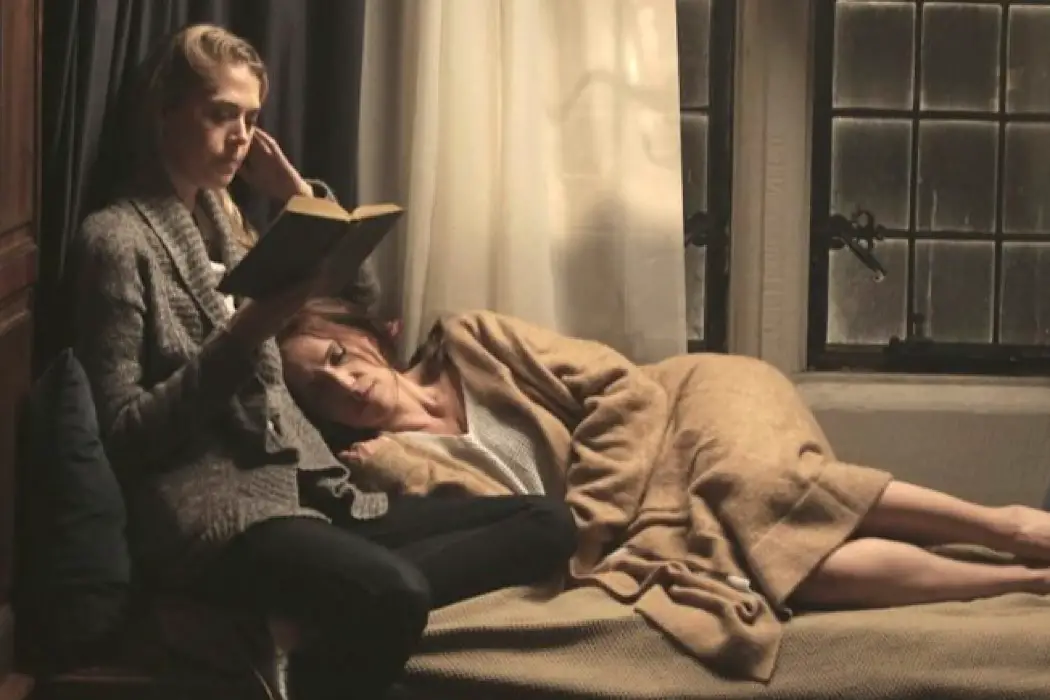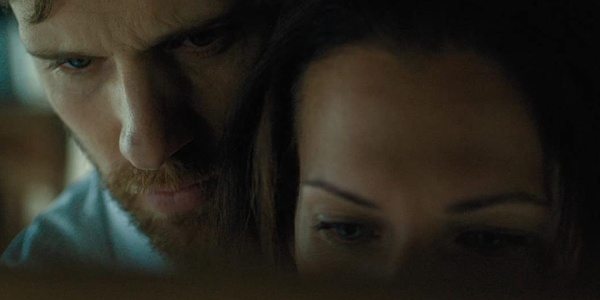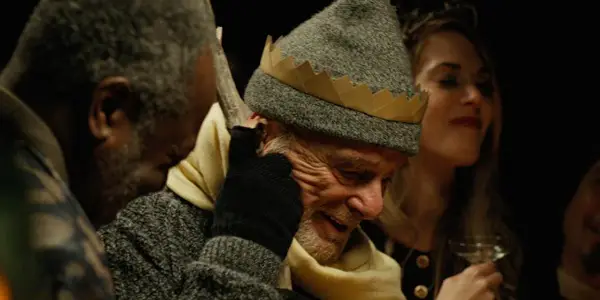THE SOUNDING: Shakespeare Drama Is All Bard, No Bite

Film critic, Ithaca College and University of St Andrews graduate,…
The Sounding is a tribute to William Shakespeare first and foremost, though that adoration often gets in the way of its storytelling. It’s also a passion project from Catherine Eaton, who directs, produces, and co-writes, adapted to a feature from Eaton’s 2015 short. (Though it played at festivals back in 2017, the film is only finding a wider release now.) Eaton stars as Olivia, an artist living on an isolated isle of Maine with her ailing grandfather, Lionel (Harris Yulin). Olivia’s mute — seemingly by choice, which renders her a sort of ingénue of the manic pixie dream variety, like a woodland sprite you’d find prancing around the Athenian forest of A Midsummer Night’s Dream.
Lionel invites prestigious psychologist Michael (Teddy Sears) to meet Olivia and study her condition. The romantic conceit is that Michael’s identity and his true purposes must remain a secret to everyone, including Olivia. But she changes in the coming days: At first, she refuses to speak, but then, it’s all words, words, words — that is to say, she begins talking only in Shakespeare quotes. Against his better judgment, Michael finds himself falling in love with her, though goodness knows she isn’t very good for conversation.
The Rotten Bit
The original 2015 short skips right to the chase, with Olivia in a psychiatric hospital, but the first half of The Sounding buries the lede, instead setting up a pretty robust mystery: Why is Olivia choosing to be silent, and then why does she only speak in Shakespeare quotes?
The film also lays the groundwork for some prime mistaken identity and dramatic irony, the kind Shakespeare always indulged in, but nothing in that department pays off. Michael succumbs to his horny demons and takes a sexy midnight swim with Olivia, then he just gives the game away and all but tells her precisely why Lionel asked him there. Eaton is less invested in the interplay among her characters than she is in the labored engine of her plot.
Despite the missteps, The Sounding has some effective scenes — our proper introduction to Olivia finds her holding a paintbrush between her lips, foreshadowing her substituting art for where language should be. And the first scene where she speaks crackles with intensity, as she’s backlit by a fireplace at the foot of her dying grandfather.

Cinematographer David Kruta keeps an even, cool color palette throughout, heavy on the natural lighting, and I particularly loved the documentary-esque transitional shots of, say, a rowboat filled with water, or a pile of empty crab cages.
But eventually, Olivia goes mad. And therein lies the rub: The film stops dead halfway through, and the mystery along with it. Olivia is spirited away to a psychiatric hospital, and the film abandons its subtler ambitions for One Flew Over a Cuckoo’s Nest shenanigans. And in the bleached white rooms of that hospital, the story is lost.
Midsummer In The Hospital
You can feel the set-up end and the short begin. The Sounding never escapes the feeling that its central conceit is still just a premise, a logline. If you wanted to see a woman standing on a table shouting the St. Crispin’s Day speech from Henry V while the patient’s rebel, then The Sounding is for you. Though, it’s likely no less exciting than its ancestor scene in Renaissance Man, when a soldier recites the same speech in the rain for Danny DeVito. But in The Sounding, at least, the scene is virtually meaningless. To quote the Bard, it’s a lot of sound and fury, signifying nothing.
To its credit, though, an ostensibly well-off white woman who chooses on a whim to speak in Shakespeare quotes for the rest of her life sounds much more unbearable on paper than it is in action. Eaton’s film avoids the snobbery that a more rigid examination of class politics might have brought in, mostly by making Olivia the victim — victim first of a sick grandfather, then of a duplicitous love interest, and finally of a health care system intent on making her life a living hell.
She does eventually get to bite into that juicy Cuckoo’s Nest role, but I think Eaton is best in the first half, when she’s fluttering in and out of scenes like a riddle to be solved, rather than in the second when she becomes the bombastic center of attention. She does, however, have a few wonderful scenes with David Furr, playing Ed, another psychologist. Few of Eaton’s other co-stars, though, can match her energy measure for measure, mostly because they lack compelling material. (There’s a reason Puck is not the main character of Midsummer.)
In its second half, The Sounding betrays its true colors — the film is only interested in the fetishization of Shakespeare’s language and the novelty of hurling the Bard’s insults at hapless psychologists and orderlies, the same echelon of comedy occupied by those Shakespearean Insult Calendars you can buy for $15 at Barnes & Noble. Don’t get me wrong — it’s fun watching Eaton rattle off all the best Shakespeare quotes like a Gatling gun. I’m sure my English professors in college would love The Sounding. But on the level of structure, character, and story, the film is immensely frustrating.
Besides our psychologist lead, Michael, it’s hard to decipher each character’s hopes or dreams, especially those of Olivia. We never learn why she suddenly snaps and starts shouting Shakespeare at people and biting police officers — at least, we don’t get a reason that makes sense. And given how rushed her breakdown is, I’m not sure Eaton or her co-writer, Bryan Delaney, worried about it too much either.
Lear And Prospero
In the opening scene, Olivia posts pages of Shakespeare’s writing onto trees, like Orlando does in As You Like It. At Lionel’s birthday party, his friends perform A Midsummer Night’s Dream for him. Later, Lionel compares Olivia to Orlando, and he himself is constantly likened to King Lear and Prospero. The dialogue is peppered with these Shakespeare quotations and references, sure, but the film never really understands what those connections mean.

Each reference is more Easter egg than plot point. Lear, after all, is a delirious, foolish monarch who wars with his daughters and loses everything, and he has very little in common with Prospero, a sympathetic sorcerer who takes over an island and enslaves the spirits who live there — and neither shares many similarities to Lionel, other than that they’re all old men.
Maybe Eaton has a different take on Shakespeare’s work, but you can’t tell by watching her characters. The cast of The Sounding is neither complicated nor fleshed-out, which makes the connections to Shakespeare’s characters seem like they’re not entirely drawn to scale, like acorns beside oak trees. When the film had ended, not only had I not learned much about the characters, but I hadn’t learned much about Shakespeare, either.
That lack of context and depth hurts what would otherwise be a bravura performance by Eaton. You want to sympathize with Olivia and understand her grief, but the script holds her back from doing anything but broad-strokes, flashing-lights mania.
Our Revels Now Are Ended
Shakespeare has a bad rap. We too often forget that all of the clichés and tropes common to the tragic, romantic, and comedic genres today can be traced back to his writing. All our modern rom-coms — and I don’t mean the ones like 10 Things I Hate About You that are directly lifted from Shakespeare — can be traced back to the plays produced in the New Comedy form between 1589 and 1613 by the Bard and his contemporaries. So why is this the direction Eaton and Delaney have taken with this premise? This safe, mirthless psychological drama?
I kept wishing that The Sounding had the courage of its convictions, to take a note from the playwright it admires so much and do something, anything, out of the ordinary, something risky and comic and daring. But instead, we end on a voiceover referencing The Tempest, which left me with too many questions — if this story is being connected to The Tempest, then who was our Prospero supposed to be? Who was our Caliban? Why was she only speaking in Shakespeare quotes, again? And was the film even set on an island at all?
The ending answers precious few questions, but I got the sense that The Sounding is, for better or worse, the exact film that Eaton intended to make. And though it pales in comparison to the work it’s built-in effigy to, it’s remarkable that 400 years on, Shakespeare’s work is still finding new ways to reach audiences — even if it’s in a chaotic psychiatric hospital, being shouted from atop a table while the patients attack the doctors.
What did you think of The Sounding? Comment below with your thoughts.
Watch The Sounding
Does content like this matter to you?
Become a Member and support film journalism. Unlock access to all of Film Inquiry`s great articles. Join a community of like-minded readers who are passionate about cinema - get access to our private members Network, give back to independent filmmakers, and more.
Film critic, Ithaca College and University of St Andrews graduate, head of the "Paddington 2" fan club.













